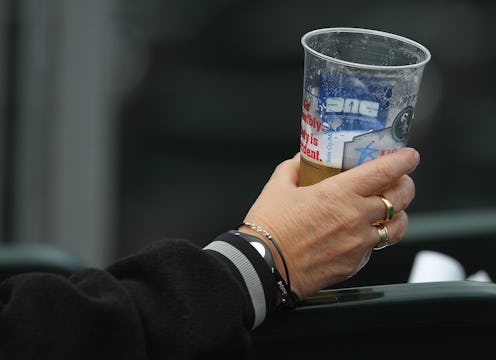News
A Can Of PBR Could Cost More Soon, Thanks To Trump

While U.S. aluminum and steel producers celebrate President Trump's proposed tariff on their materials this week, some other industries are not pleased. Faced with increased production costs, some companies could hike up prices on a number of consumer goods. In one particularly mainstream example, analysts are saying that Trump's aluminum tariff could increase the price of beer.
Beer, the most popular alcoholic beverage in the United States, often comes in aluminum cans. If the tariff forces beer manufacturers to buy more expensive aluminum, they might respond by increasing the price of their products.
"Businesses don’t assume cost increases, they pass them on to consumers. That’s the nature of business," economic analyst Nico von Stackelberg told The Wall Street Journal.
Trump's tariff, which he announced on Thursday, involves a 25 percent tax on imported steel and a 10 percent tax on imported aluminum. The move is meant to incentivize manufacturers to purchase these materials from U.S. companies, which in recent years have preferred to buy them abroad where they're produced more cheaply. Critics of Trump's plan worry that the taxes will cause foreign countries that export steel to the United States to retaliate with their own steep tariffs.
Others dislike the president's stated rationale: During the 2016 presidential campaign, he advocated protectionist trade policy to help U.S. workers, but he's justifying this tariff for "national security" reasons. Some analysts say he means that the United States' access to steel and aluminum won't be disrupted if international conflict ensues.
Everyday consumers who are critical of the tariff are mainly concerned with the potential for aluminum and steel products to increase in price. If you drink beer, the change could affect you, too.
Chances are that you do drink some canned beer, if you drink beer at all. The Wall Street Journal reports that over half of the beer made in the United States each year is produced in aluminum cans or aluminum bottles. These types of beers are often cheaper than those that come in glass bottles, which are typically associated with craft beer, though many craft breweries have begun opting for cans in recent years.
A coalition of beer and other drink producers that includes Molson Coors Brewing Co. and Heineken NV has advocated strongly against the tariff. In February, these companies told Trump that they expected his proposed taxes to increase the annual cost of producing their drinks by $256.3 million.
The Beer Institute, a trade association, released a statement criticizing the Trump's plan on Thursday. "According to third-party analyses, this 10% tariff will create a new $347.7 million tax on America’s beverage industry," it said.
"American workers and American consumers will suffer as a result of this misguided tariff," MillerCoors tweeted on Thursday.
But if prices on beer do increase, the change may be small. The Washington Post reports that the matter of "how hefty the price jumps are going to be" is currently a "big debate." The New York Times writes that "there’s not much reason to expect enormous price increases for most goods."
Trump's move has angered the globalist, free-trade wing of the Republican Party, whose response has echoed that of the beer companies. "The president is proposing a massive tax increase on American families," said Sen. Ben Sasse (R-NE). Additionally, Sen. Orrin Hatch (R-UT) said that the tariffs will constitute "a tax hike the American people don't need and can't afford."
Trump has reportedly acknowledged that the tariffs will likely lead to an increase in the prices of aluminum and steel products, but called it "a small price to pay."
The Washington Post notes that beer isn't the only popular product that could see jacked-up prices. "Steel and aluminum are used in a lot of everyday products," said reporter Heather Long. "If you drink beer, soda, or LaCroix, you probably get it from an aluminum can. If you drive a car or truck, it probably has some steel and aluminum in it. You get the idea."